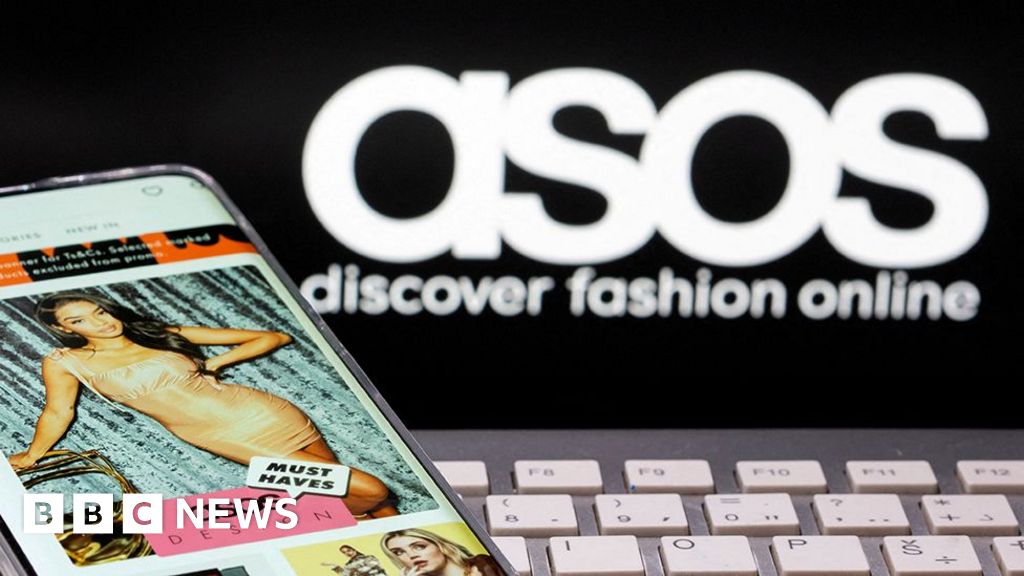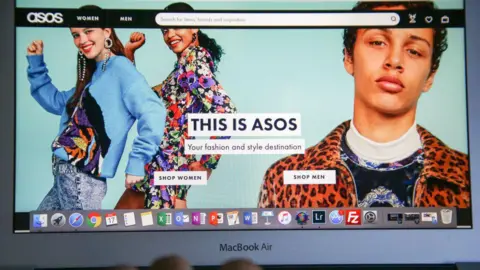Asos shoppers hit out at new £3.95 returns charge

 Getty Images
Getty ImagesAsos customers have reacted with anger over a new rule charging them for returns if they do not keep a certain amount of their order.
Some customers received an email over the weekend saying they had been identified as having a “frequently high return rate”.
Such customers will now have £3.95 deducted from their refund if they keep less than £40 worth of items.
Asos has not said what constitutes a high return rate, but claimed “nothing’s changed” for the majority of its customers.
“We’re making this change so that we can continue offering free returns to all our customers,” the company told the BBC.
“For a small group of UK customers with a frequently high return rate whose shopping habits make offering them unconditional free returns unsustainable, they can still get free returns when they keep £40 or more of their order.”
The retailer said customers signed up to Asos Premier will get free returns if they keep at least £15 of their order.
The threshold for free returns was launched for Asos customers in France, Germany and the US earlier this year.
Sowda, from London, is a regular customer of Asos but said the change would “definitely” make her less inclined to buy there.
“The point of online shopping is that it is a risk but you can claim all your money back if you’re not satisfied,” the 22-year-old said.
“Although £3.95 is not a hefty sum, that could add up over the year and it’s a waste of money.”
She added that Asos was “notorious” for its inconsistent sizing. “Just recently I got the same jeans three times to finally get the right fit,” she added.
“I would never have been that committed to the jeans if there was a £3.95 fee every time I sent them back.”
One customer named Charlotte wrote on X, formerly Twitter: “The problem for large returns is the fact half of your stock is ill fitting and poor quality.
“I’ll take my custom somewhere else.”
Allow Twitter content?
Kayley Cornelius, a media analyst, said the popularity of Asos among influencers and online content creators could be a factor in the company’s decision to charge some customers for returns.
“It’s common to see influencers doing huge ‘hauls’ where they spend hundreds of pounds and then decide on camera what they’re keeping or returning,” she said.
“Regular shoppers probably followed suit, leading to an influx of returns after the initial purchase, which might have forced Asos to tighten their return policy to make people think more carefully before buying.”
Returns policy changes
Online-only clothes shops like Asos have faced challenges with the rate of returns normalising, rising competition from ultra-fast fashion brands like Shein, and customer budgets being squeezed due to the higher cost of living.
Earlier this year, PrettyLittleThing (PLT) was criticised by customers who had their accounts deactivated because of the number of times they returned items.
It came shortly after PLT introduced a £1.99 fee for returns, including for those members of its “royalty” service.
Last year, fashion giant H&M backtracked on a similar policy after criticism.
Asos said in a trading update last week that it had made improvements to sizing and how clothing and accessories are displayed on product pages.
Last week, Asos announced it was selling the majority of its stake in the Topshop and Topman brands for £135m.
Related
Why investing in women is a vital next step for…
Get Nadine White's Race Report newsletter for a fresh perspective on the week's newsGet our free newsletter from The Independent's Race CorrespondentGet our fre
Business secretary signals major shift on electric car policy to…
In a determined effort to retain Nissan’s manufacturing presence in Britain, Business Secretary Jonathan Reynolds has vowed to implement “substantial c
Joint Statement: Business Secretary and Fujitsu Services Ltd
Business and Trade Secretary Jonathan Reynolds today (Friday 7 March) met chiefs for Fujitsu in Tokyo to begin talks over the cost of redress for victims of th
UK foreign secretary backs multilateral defence funding for Europe
UK foreign secretary David Lammy has said that a new multilateral fund will be needed to secure Europe’s defence as he confirmed that Britain is “open to”













